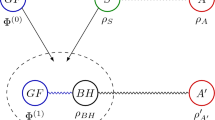Abstract
Bekenstein and Hawking saved the second law of thermodynamics near a black hole by assigning to the hole an entropyS h proportional to the area of its event horizon. It is tempting to assume thatS h possesses all the features commonly associated with the physical entropy. Kundt has shown, however, thatS h violates several reasonable physical expectations. We review his criticism, augmenting it as follows: (a)S h is a badly behaved state function requiring knowledge of the hole's future history; and (b) close analogs of event horizons in other space-times do not possess an “entropy.” We also discuss these questions: (c) IsS h suitable for all regions of a black-hole space-time? And (b) shouldS h be attributed to the exterior of a white hole? One can retainS h for the interior (respectively, exterior) of a black (respectively, white) hole, but we reject this as contrary to the information-theoretic derivation of horizon entropy given by Bekenstein. The total entropy defined by Kundt (all ordinary entropy on space-section cutting through the hole, no horizon term) and that of Bekenstein-Hawking (ordinary entropy outside horizon plus horizon term) appear to be complementary concepts with separate domains of validity. In the most natural choice, an observer inside a black hole will use Kundt's entropy, and one remaining outside that of Bekenstein-Hawking.
Similar content being viewed by others
References
Christodoulou, D. (1970).Phys. Rev. Lett.,25, 1596; Christodoulou, D. and Ruffini, R. (1971).Phys. Rev. D,4, 3552.
Hawking, S. W. (1971).Phys. Rev. Lett.,26, 1344; explained more simply: Hartle, J. B. (1973). InRelativity, Astrophysics, and Cosmology, ed. W. Israel, (D. Reidel, Dordrecht), Sec. 5.1.
Bekenstein, J. D. (1972). Ph.D. thesis (Princeton University), unpublished; (1973).Phys. Rev. D, 7, 2333; (1974).ibid.,9, 3292.
Bardeen, J. M., Carter, B., and Hawking, S. W. (1973).Commun. Math. Phys.,31, 161.
Gerlach, U. (1976).Phys. Rev. D,14, 3290.
Hawking, S. W. (1976).Phys. Rev. D,13, 191.
Kundt, W. (1976).Nature,259, 30.
Davies, P. C. (1976).Proc. R. Soc. London Ser. A,351, 129; Unruh, W. G. (1977).Phys. Rev. D,15, 365.
Hawking, S. W. (1973). InBlack Holes, eds. De Witt, C., and De Witt, B. S. (Gordon and Breach, New York), p. 5; Rindler, W. (1956).Mon. Not. R. Soc.,116, 662.
Rindler, W. (1966).Am. J. Phys.,34, 1174.
Umuh, W. G. (1976).Phys. Rev. D,14, 870; and in (1977).Marcel Grossman Meeting on General Relativity, ed. R. Ruffini (North Holland Publishing Co., Amsterdam), pp. 527–536.
Misner, C. W., Thorne, K. S., and Wheeler, J. A. (1973).Gravitation (W. H. Freeman, San Francisco), p. 452, Eq. (19.13).
Birrell, N. D., and Davies, P. C. W. (1978).Nature,272, 35.
Bekenstein, J. D. (1973).Phys. Rev. D,7, 2333.
Wheeler, J. A. (1971). InThe Astrophysical Aspects of the Weak Interactions (Accad. Naz. dei Lincei, Roma), pp. 133–164.
Zeldovich, Ya. B., and Novikov, I. (1971).Relativistic Astrophysics, (University of Chicago Press, Chicago), p. 115.
Wilkins, D. (1979).Gen. Rel. Grav.,11, 59.
Misner, C. W., Thorne, K. S., and Wheeler, J. A. (1973).Gravitation (Freeman, San Francisco), p. 667, Fig. 25.5.
Author information
Authors and Affiliations
Rights and permissions
About this article
Cite this article
Wilkins, D. Does black-hole entropy make sense?. Gen Relat Gravit 11, 45–58 (1979). https://doi.org/10.1007/BF00756671
Received:
Issue Date:
DOI: https://doi.org/10.1007/BF00756671




